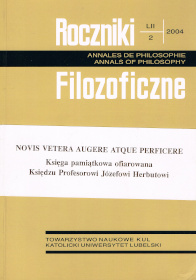Transcendentality and Historicity of Aesthetic Experience. Richard Schaeffler's concepti
Abstract
In his theory of aesthetic experience, Richard Schaeffler proposes the synthesis of transcendental and historical reflection. The aesthetic experience is an a priori and historically conditioned dialogue with reality. Transcendental philosophy asserts that the a priori structures of reason enable the constitution of the object of experience. Historical philosophy, on the other hand, claims that these structures are historical and contingent. According to Schaeffler, these structures change under the influence of the content of aesthetic experiences, namely paradoxical content. Under the influence of these paradoxes, the structures of aesthetic consciousness are modified. The changes in the structures of consciousness cause the aesthetic experience (and any human experience) to asymptotically approach reality.
W swojej teorii doświadczenia estetycznego Richard Schaeffler proponuje syntezę refleksji transcendentalnej i historycznej. Doświadczenie estetyczne jest a priori i historycznie uwarunkowanym dialogiem z rzeczywistością. Filozofia transcendentalna twierdzi, że a priori struktury rozumu umożliwiają ukonstytuowanie się przedmiotu doświadczenia. W przeciwieństwie do tego filozofia historyczna twierdzi, że struktury te są historyczne i przygodne. Według Schaefflera struktury te zmieniają się pod wpływem treści przeżyć estetycznych, czyli treści paradoksalnych. Pod wpływem tych paradoksów modyfikowane są struktury świadomości estetycznej. Zmiany w strukturach świadomości powodują, że doświadczenie estetyczne (i każde doświadczenie ludzkie) asymptotycznie zbliża się do rzeczywistości.
Copyright (c) 2004 Roczniki Filozoficzne

This work is licensed under a Creative Commons Attribution-NonCommercial-NoDerivatives 4.0 International License.





